

The Anglo-Saxon charms. Olympic Spirits - Nick Farrell. Olympic Spirits: The Hidden Gods by Nick Farrell In the 3=8 ritual of the Golden Dawn the candidate was shown a diagram of the seven Olympic Spirits.
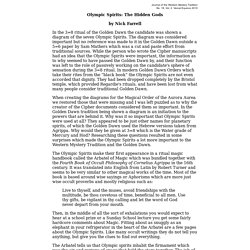
The diagram was considered important but no reference was made to it in the Golden Dawn outside a 5=6 paper by Sam Mathers which was a cut and paste effort from traditional sources. SATHYAM SHIVAM SUNDARAM: Práctica y rezos a Ganesha. Ver para creer.
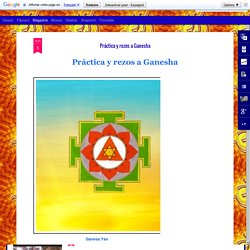
Los muchos nombres, variadas descripciones y atributos de una deidad que sea difícil, si no imposible, que un adorador de comprender la esencia de una deidad. Los antiguos videntes tántricos, para superar estas limitaciones, las herramientas ideadas para la meditación que facultaría un devoto. El yantra - en sánscrito, una máquina o dispositivo que absorbe energía cósmica - es una de estas herramientas, una representación visual, abstracta de la forma o el cuerpo de una deidad en la que un devoto puede fijar su mirada. Típicamente, un yantra está inscrito con mantras, cantos místicos que se centran la mente. Representación Cada yantra tiene cualidades específicas. Lists Archives - Unbound Worlds. Between God & The Devil: Mexico's Land of Sorcerers.
Ravachol. François Claudius Koënigstein (1859 - 1892), más conocido por Ravachol, fue un anarquista francés que se volvió famoso por sus atentados.
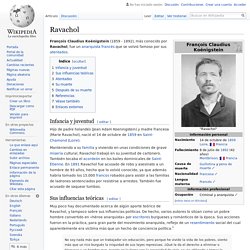
Infancia y juventud[editar] Hijo de padre holandés (Jean Adam Koeningstein) y madre francesa (Marie Ravachol), nació el 14 de octubre de 1859 en Saint-Chamond (Loire). Sus influencias teóricas[editar] Muy poco hay documentado acerca de algún aporte teórico de Ravachol, y tampoco sobre sus influencias políticas. De hecho, varios autores lo sitúan como un pobre hombre convertido en «héroe anarquista» por escritores burgueses y románticos de la época. No soy nada más que un trabajador sin educación, pero porque he vivido la vida de los pobres, siento más que un rico burgués la iniquidad de sus leyes represivas. Atentados[editar] Su muerte[editar] Su proceso se inició el 26 de abril; fue condenado a cadena perpetua por el atentado, y a muerte en un segundo proceso, acusado de tres homicidios pasados. An American Retrograde – GODS & RADICALS.
“The fall of peoples and mankind will invite me to my rise.”- Max Stirner, The Ego and His Own Perhaps the fates had finally turned against humanity.

What other explanation existed for a mercury retrograde coming right after the most batshit election the American people had ever suffered? Everything was an abysmal mix of high comedy and cosmic terror. Mexico: Fifty Anarchist Groups at War Against Capitalism and the State. From ContralíneaTranslation submitted to It’s Going Down* all footnotes by translator In Mexico there is an ongoing anarchist insurrection, with 50 groups and cells at war with the State and capital.

The seriousness of the “black threat” has caused the National Risk Agenda [1] to give it priority attention, ahead of the red guerrillas[2], with only drug trafficking and social uprisings given a higher priority. Let the night illuminate and rock the city; let the roar awaken the powerful in their bondage. The Sacred Conspiracy by Georges Bataille 1936. Adventures In Witchery. Ritual Offerings. Simon Magus. (flourished c. 35 e.v.) by T.
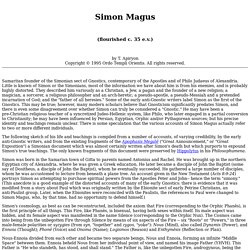
Apiryon Copyright © 1995 Ordo Templi Orientis. All rights reserved. Simon Magus. Back to Home Page or Contents Page or People or Index Simon Magus Simon Magus was labeled "the father of all heretics" by Irenaeus in the Preface of his "Against Heresies, III.
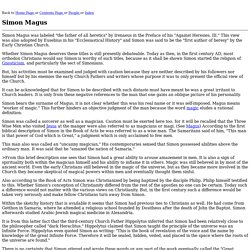
" This view was also adopted by Eusebius in his "Ecclesiastical History" and Simon was said to be the "first author of heresy" by the Early Christian Church. Whether Simon Magus deserves these titles is still presently debateable. Today as then, in the first century AD, most orthodox Christians would say Simon is worthy of such titles, because as it shall be shown Simon started the religion of Gnosticism, and particularly the sect of Simonians. Simon Magus, by G.R.S. Mead. Everybody in Christendom has heard of Simon, the magician, and how Peter, the apostle, rebuked him, as told in the narrative of the Acts of the Apostles.
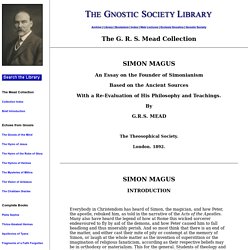
Paul the Apostle, Simon Magus, and a Curious Gospel. One of the most notorious arch-heretics of early Christianity was an enigmatic figure known as Simon Magus (Simon the Magician) or Simon of Samaria.
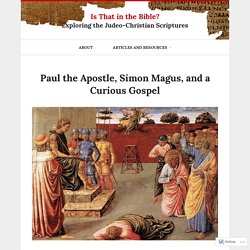
In case you’re not familiar with him, here’s a brief run-down on what various texts say about him: According to Josephus (Antiquities XX.7 §2), there was a Cypriot named Simon who pretended to be a magician, and he was a personal friend of Felix, the procurator of Judea (52–58). Acting on behalf of his friend, Simon persuaded the beautiful Drusilla, the sister of king Agrippa II, to leave her husband and marry Felix.In Acts 8, there is a character named Simon who has bewitched the people of Samaria with his magic.
He converts to Christianity at the preaching of the evangelist Philip, but is rebuked by Peter for trying to purchase Peter and John’s spiritual abilities with money.Justin Martyr (First Apology I.26) wrote of a Samaritan named Simon who was venerated by some as a god in Rome and elsewhere because of his magic. Like this: